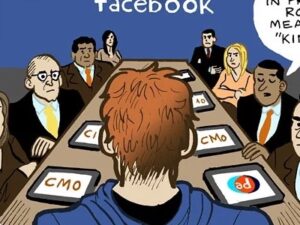Hell’s Bells
In the immortal words of Eric Seufert, everything is (or becomes) an ad network. And then it gets ruined.
Seriously, though, businesses that shift to ad-funded models generally make bank – but their growth comes at a price.
Take juggernaut The Knot, which was once an editorial and direct resource for people planning weddings. It also launched an advertising business focused on vendors, such as photographers, florists, dress-makers and DJs.
But in late 2018, when it merged with WeddingWire, a private equity-backed competitor, the guardrails came down.
The Knot’s ad business generated $4 billion in consumer spending with wedding vendors last year, The New Yorker reports. But some vendors feel it’s a predatory system, since they commit to yearlong advertising contracts in return for guaranteed leads. Many vendors suspect companies use fake brides and/or fiancés to reach out via a phone bank, collecting on leads that never pay off.
On the other hand, Google, Meta and open web advertising in general is rife with fake and inflated metrics.
“In digital marketing, a portion of what you’re buying is not a real audience,” Rich Kahn, co-founder and CEO of ad fraud solution Anura, tells The New Yorker. “But that’s not a defense. It’s on you to do something about it.”
Silo Barn Burner
There’s something the Trump administration has in common with the ad tech world: a hatred of data silos.
As Wired reports, stopping waste, fraud and abuse by eliminating information silos – which happens to be the title of the executive order Trump signed on March 20 – can be good for a company hoping to make more efficient and insight-driven business decisions.
Don’t get too excited, though.
In the case of a government entity, those silos typically exist for a reason. Medical and tax data, for example, is often shielded from other databases for privacy reasons.
The wall between state and federal records also protects citizens in cases where the law is split, such as with abortion access, immigrant sanctuary policies and even cannabis legalization, just to name a few.
Plus, there’s the obvious elephant (or doge) in the room.
So far, at least, the new administration doesn’t have a great track record for efficient government downsizing or effective information security.
Copy That
A federal judge recently denied OpenAI’s and Microsoft’s motions to dismiss a copyright infringement case against them brought by The New York Times. The case – which many publishers hope will bring about a reckoning for generative AI’s unrestrained content scraping – is now set to go to trial.
On Friday, Judge Sidney Stein of the Southern District of New York published his opinion – and he believes the plaintiff’s copyright claims have merit, particularly when it comes to violations by end users.
“The question at this stage is simply whether plaintiffs have plausibly alleged that end-user infringement has taken place,” Judge Stein writes. “The Court finds that plaintiffs have done so.”
In other words, the trial can examine whether generative AI outputs created derivative works using NYT’s reporting. And, as Judge Stein adds, “plaintiffs include numerous examples of infringing outputs in their complaints.”
Judge Stein did agree to dismiss some of the allegations against OpenAI and Microsoft, including certain claims related to the removal of copyright management information required by law.
But he allowed NYT’s main challenge on copyright grounds to proceed. He also declined to limit the scope of the case to works published within the past three years, which improves NYT’s outlook at trial.
But Wait! There’s More
More brands are blending deterministic and probabilistic data for targeting. [Digiday]
Apple TV+ has earned accolades and attention, but its streaming market share is stubbornly flat. [9to5Mac]
Redbrick, a Canadian software holding company, has bought Quartz and product review publisher The Inventory from G/O Media. [Axios]
President Trump thinks the new 54% tariff rate on China will give the US better negotiating power, including on the pending TikTok sale. [Business Insider]
Amazon and Google are coming for Microsoft’s federal contract money. [Bloomberg]
AI companies have no idea if Trump’s tariffs just killed their GPU supply. [The Verge]













